These 3 powerful negotiation tips no one tells you can be a game changer for your negotiation. There are negotiation tips you hear again and again, but what about those less mentioned tips that can really help your negotiation game? A few powerful negotiation tips are often left out because they are deemed controversial. This is precisely the reason you need to know them. You need to know these “secret” powerful negotiation tips that will allow you to level up your negotiation game and get ahead.
Powerful Negotiation Tip #1: You Can Make the First Offer
The first powerful negotiation tip that no one tells you is that you can make the first offer. It is a negotiation myth that you can’t make the first offer. Your resistance to name a price may adversely affect the negotiation.
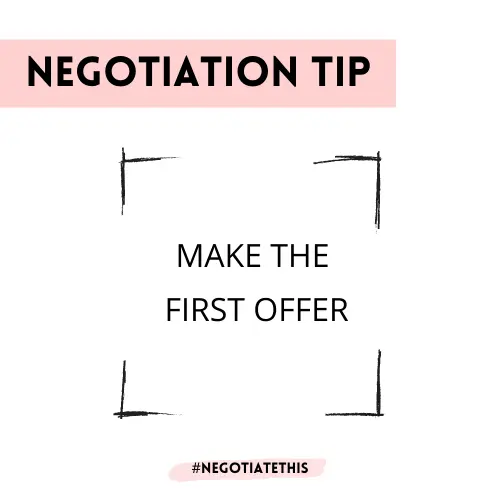
This negotiation tip is powerful because the first spoken number is very influential. The first number given in a negotiation is the number in which the negotiation revolves. This is called “anchoring” in a negotiation. “Anchoring is a well-known cognitive bias… When conditions are uncertain, high anchors draw our attention to the positive qualities… and low anchors draw attention to flaws” (Harvard Law, 2020). We want to make a high first offer so our negotiation collaborator recognizes the positive attributes of what is being negotiated.
“Substantial psychological research suggests that, more often than not, negotiators who make first offers come out ahead” (Galinsky, 2004).
Negotiations can feel tricky and you can easily believe that “you’ll gain valuable information about your opponent’s bargaining position” if they make the first offer (Galinsky, 2004). Don’t let this phase you or fool you. Letting your negotiation collaborator make the first offer “makes intuitive sense, but it fails to account for the powerful effect that first offers have on the way people think about the negotiation process” (Galinsky, 2004). Making the first offer is very powerful within the negotiation. By making the first offer, you are the one exerting this power. Do not give up your power.
Don’t Be Afraid to Make the First Offer
Making the first offer can leave you feeling like you potentially left money on the table, but this is not as likely as you think. “People hate to go first, if only because going first might mean missing out on an opportunity… In the real world, that rarely happens, because the other person almost always has a reasonable understanding of value” (Haden, 2016).
You want to make the first offer because your resistance to name an anchor in a negotiation leaves the potential for the other party to set a low anchor.
If you are looking for more negotiation tips, you may be interested in:
Overall, don’t be afraid to name the first offer. Do your research to figure out the market range. Doing due diligence in your research is key.
Powerful Negotiation Tip #2: Silence Is Your Friend
The term “silence is golden” has never been truer for a negotiation tactic. The second powerful negotiation tip that no one will tell you is that silence and long pauses are vital in negotiations. They are your friends in a negotiation. Initiate them. Don’t feel compelled to respond immediately after every stop in the conversation.
If your negotiation collaborator tells you there’s no room in the budget, pause. Don’t respond. It will let them know you are serious about your request. It may also turn the tables and make them feel a little uncomfortable. This is ideal. This will put you in control. If your negotiation collaborator has a little discomfort, this gives you the upper-hand.
Refrain from immediately filling the silence. Use this time to think about your response. Take time to pause. Think about how you want to proceed to get what you really want.

Many people try to fill a silence by saying what the other person wants. This can also work to your advantage. If your negotiation collaborator wants to immediately fill that silence, let them. Oftentimes, people will interrupt a pause to appease the other party. Let that happen. Let your negotiation collaborator appease your wants.
Practice Your Silence
Practice your silence. It will be hard to let a meaningful pause pass, but if you practice beforehand, it can have positive impacts. A few seconds without someone speaking can feel like a very long time. When you’re prepping for the negotiation, set a timer for 10 seconds of silence. Sit with that silence. Know what it feels like so you are ready to apply the pause strategy during the negotiation.
As Maria Bamford (@mariabamfoo) suggests, “So I think you have nothing to lose to ask, ‘This is what I’d like.’ And then maybe they come back, and just be quiet. It’s the most important thing. You say what you want and just shut up and sit with the discomfort of that. And then just see what happens” (Bamford, 2020; Vulture, 2020; Klein & Ma, 2020).
Silence is okay in a negotiation. Feeling uncomfortable is okay. Making your negotiation collaborator uncomfortable is okay. It’s all part of the process.
Silence is a tool in negotiation. Use it to your advantage.
Powerful Negotiation Tip #3: Aim Higher
The third powerful negotiation tip that no one will tell you is that you can ask for more than you think. Contrary to common belief, we are not asking for enough. Research shows that “most negotiators make first offers that are not aggressive enough” (Galinsky, 2004). Aim even higher. Ask for more. Results follow expectations. Aim higher. Don’t undervalue yourself.
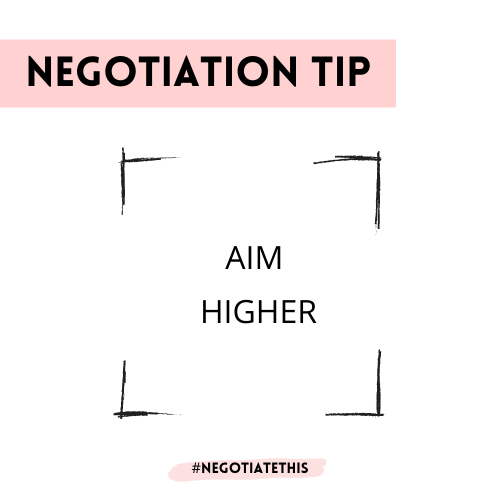
Aim Higher with the First Offer
After you’ve decided to make the first offer, make it a high one. Making the first offer allows you to set a high “anchor” offer. Your first high offer deters your negotiation collaborator from setting a low offer “anchor,” which ultimately makes the process dance around a lower number the whole time instead of a higher number that you put forth. “How extreme should your first offer be? My own research suggests that first offers should be quite aggressive but not absurdly so” (Galinsky, 2004).
Remember that the lowest number you name is the price you would potentially be happy walking away with as an outcome. With your first offer, expect to be negotiated down. It’s part of the negotiation process. This is why you begin with a high offer. Coming in with a high offer shows that you’re confident in your skills, you’re worth the price and most of all, you know your worth.
Know the Range and Exceed It
In the words of Bozoma Saint John @badassboz, Global Chief Marketing Officer at Netflix, “Give the number first. Make it high as hell because then you can’t be low-balled … Do the work. Don’t just call a number out of the sky. Know the range and then exceed the range because then you can negotiate down just a little bit” (CBS News, 2018; Klein & Ma, 2020). Do your research. Have firm footing while understanding the range. Then go above the range like Bozoma Saint John directs. Take control of the situation and ask for more.
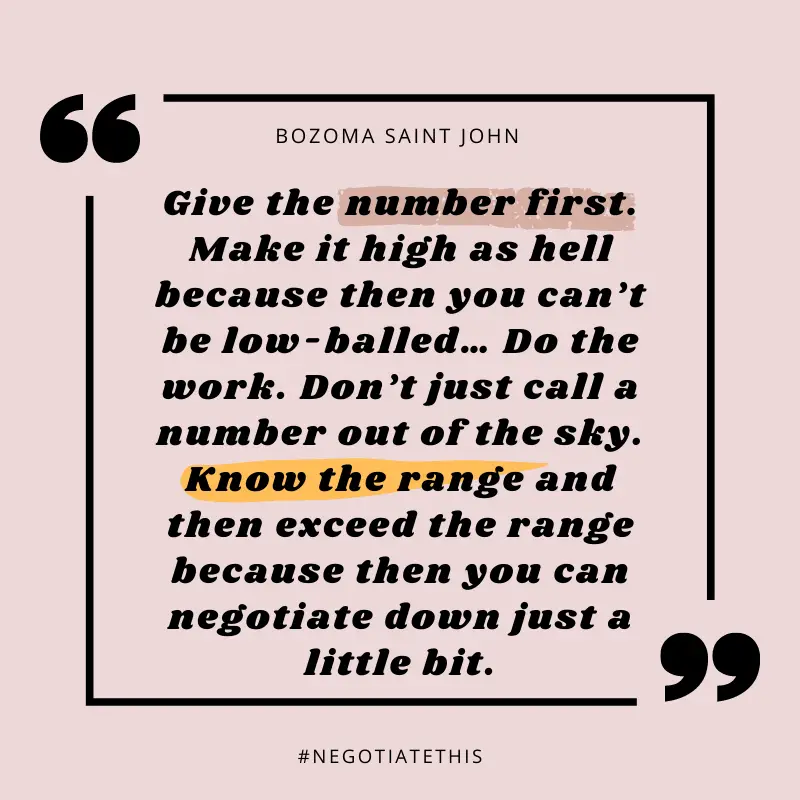
Don’t be afraid. As mentioned while making the first offer, we can sometimes feel like we are making a mistake by making the first offer. We may feel like we are leaving money on the table or that it will be a nuisance to our negotiation collaborator. “Many negotiators fear that an aggressive first offer will scare or annoy the other side and perhaps even cause him to walk away in disgust. However, research shows that this fear is typically exaggerated. In fact, most negotiators make first offers that are not aggressive enough” (Galinsky, 2004). This is largely in our heads. Don’t let far lead you. Be confident in making your first offer and make it an aggressive offer.
Ask Around
How do you know how high you can go? Ask around. Market research can take you only so far. Ask around and you might be surprised to figure out that you can definitely ask for more than you thought. “Don’t be afraid to be aggressive” (Galinsky, 2004). Be sure to be asking the highest earners in your organization or industry. Then, add tax, add inflation, add past inequities to the number – aim higher! Results follow expectations.
Can I Aim Higher Even Now?
Yes. You can aim higher, even now.
During an economic downturn (which happens every 10 years or so), the people that are historically affected by the wage gap suffer the most. Let that sink in. The same people are “paying” the price decade after decade while others are profiting. Keep in mind that, “being underpaid now can very well mean being underpaid in the future” (Kramer, 2018; Copeland, 2018).
Some companies are suffering, yes. Some are doing just fine and those might be the ones paying you. Successful salary negotiations have taken place in economic downturns. Don’t be afraid to ask for your worth. Even during an economic downturn, people are getting raises and promotions. It’s worth a try and it shows the company that you know your value. Use these powerful negotiation tips together to receive your worth.
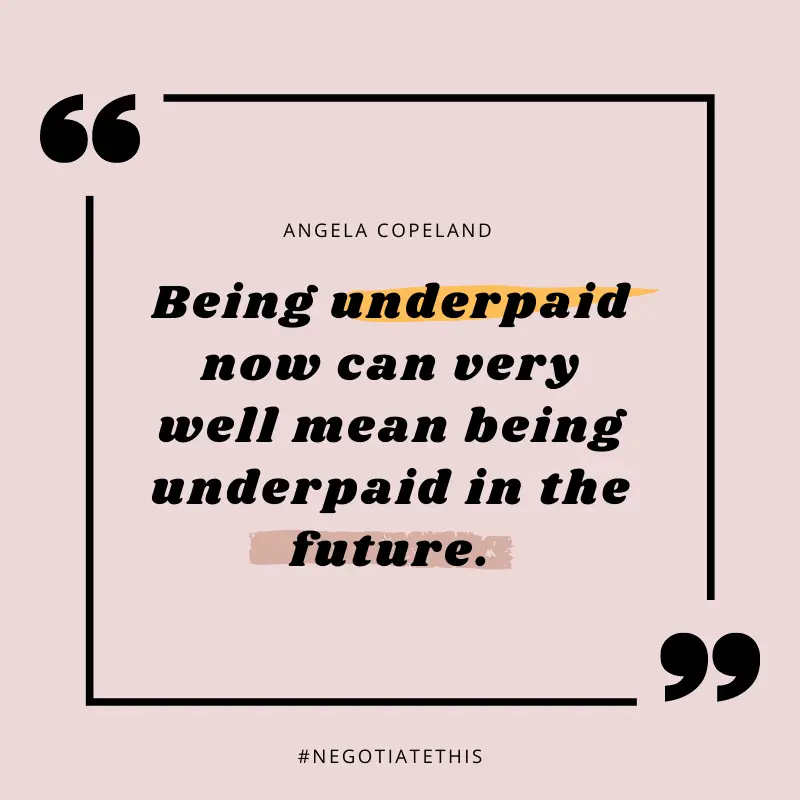
Don’t be afraid to ask for your worth. Make the first offer, use silence to your benefit, and aim higher.
Use these 3 powerful negotiation tips that no one (or not many) will tell you for your benefit throughout your negotiation process. By using these 3 powerful negotiation tips, you will have an advantage in your negotiation.
You got this. Negotiate for all your worth.
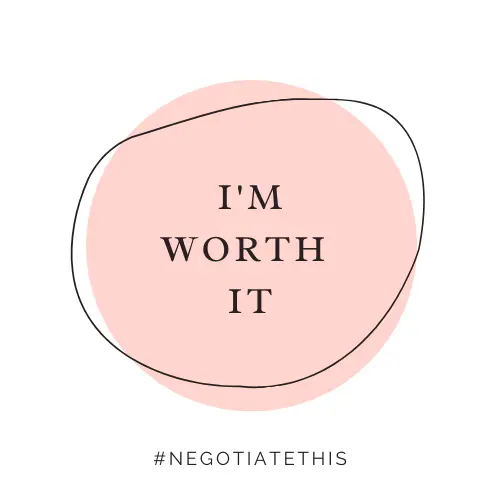
—-
Sources
- Article: “25 Famous Women on How to Negotiate Salary” (2020) @thecut
Authors: Charlotte Klein, Julie Ma
Quoted: Bozoma Saint John @badassboz, Global Chief Marketing Officer at Netflix - Article: “What is Anchoring in Negotiation? Learn How to Defuse the Anchoring Bias and Make Smart First Offers” (2020) @harvardlaw, Harvard Law
Author: Katie Shonk - Article: “How to Negotiate Salary After a Job Offer: 6 Tips to Get More Money” (2019) @thecut
Author: Alison Green - Article: “11 Ways to Negotiate Better With Anyone (Especially If You Hate to Negotiate)” (2016) @incmagazine
Author: Jeff Haden - Article: “When to Make the First Offer in Negotiations” (2004) @harvardhbs, Harvard Business School
Author: Adam D. Galinsky - Article: “7 Signs You’re Underpaid – And How to Earn More Now” (2018) @glassdoor
Author: Jillian Kramer
Contributor: Angela Copeland, Career Expert @copelandcoaching
—-
Disclaimer:
While the contents of this post and blog come from research and personal experience, each experience, situation and/or person has their own unique circumstances. This is not negotiation, financial or any other form of legitimate or official advice from an expert. Each individual should do their own independent, comprehensive research. Negotiation, career and all other decisions are the sole responsibility of each individual or party. Details found on the blog and in individual posts are opinions and should be treated as such for entertainment purposes only. Read further disclaimer information in the footer and on the Disclaimer page.
